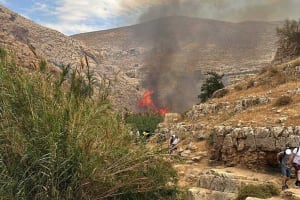In apparent effort to shore up ties with strategic ally, Israel recognizes Moroccan sovereignty over Western Sahara
Israel normally avoids taking positions on territorial disputes in other parts of the world

In a move breaking with tradition, Israel recognized Morocco’s sovereignty over the disputed Western Sahara region on Monday, according to the Moroccan Ministry of Foreign Affairs.
Western Sahara is a predominantly desert area situated on the northwest coast of Africa. Until the mid-1970s, it was a Spanish colony and was later annexed by Morocco in 1975. Since that time, the area has been disputed between Morocco and its indigenous Sahrawi people, led by the Polisario Front.
In 2020, Israel and Morocco officially normalized ties as part of the American-brokered Abraham Accords. At the time, the United States agreed to recognize Western Sahara as Moroccan territory.
More recently, Israel and Morocco have increased diplomatic relations with one another. In June, Israeli National Security Advisor Tzachi Hanegbi visited Morocco and met with Moroccan Foreign Minister Nasser Bourita, prompting reports in the Israeli media that Israel was considering recognizing Moroccan sovereignty over the region.
David Schenker, a senior fellow at the Washington Institute for Near East Policy, said the move by Israel was “inevitable” after establishing and normalizing relations with Morocco in 2020.
“Morocco is looking forward to more countries recognizing their sovereignty,” Schenker told Al-Monitor. “This is both productive for the bilateral relationship and something that Morocco values greatly.”
According to Schenker, who served in the State Department when the U.S. recognized Morocco’s claim to Western Sahara, the move is in line with Israel’s efforts to “expand ties” with Arab states and Western Sahara is a “potential locale” for an Israeli consulate.
The Algerian-backed Polisario militia is opposed to Moroccan sovereignty and has fought to establish an independent state in the region. Schenker pointed out that Algeria already has a clear stance on the Israeli-Palestinian conflict, and there is not much the North African country can do in response to the recognition.
“Algeria is very firmly in the Palestinian camp. It is unclear what Algeria would do,” he said.
The recognition on Monday, a first for the Jewish state, came last month after Morocco canceled its plans to host the Negev Forum, a framework led by the U.S. to promote integration in the region. The cancellation was a response to Israel’s plan to expand settlements in the West Bank.
Following the cancellation, Bourita said his country would be willing to host the second Negev Forum in the fall under certain conditions.
“We hope that the context will be favorable to holding this important event on the one hand, but also that it will produce results on the other,” Bourita said during a press briefing.
Due to the Israeli-Palestinian conflict, Israel normally avoids taking positions on territorial disputes in other parts of the world. The main concerns are that precedents set by these other sovereignty disputes could negatively affect Israel.
While Israel has drawn close to Morocco in the last few years, its neighbor has remained hostile to the Jewish state.
When the Abraham Accords were signed in 2020, Algeria blocked Israel’s bid to join as an observer in the African Union.
Israel Defense Forces also appointed a first military attaché to Morocco on Monday, Col. Sharon Itach from the Home Front Command. Itach is of Moroccan origin and currently heads the Home Front Command’s Haifa district.
Last June, IDF Chief-of-Staff Lt.-Gen. Aviv Kochavi visited Morocco in the first-ever official visit by an Israeli army chief to the North African nation.

The All Israel News Staff is a team of journalists in Israel.














